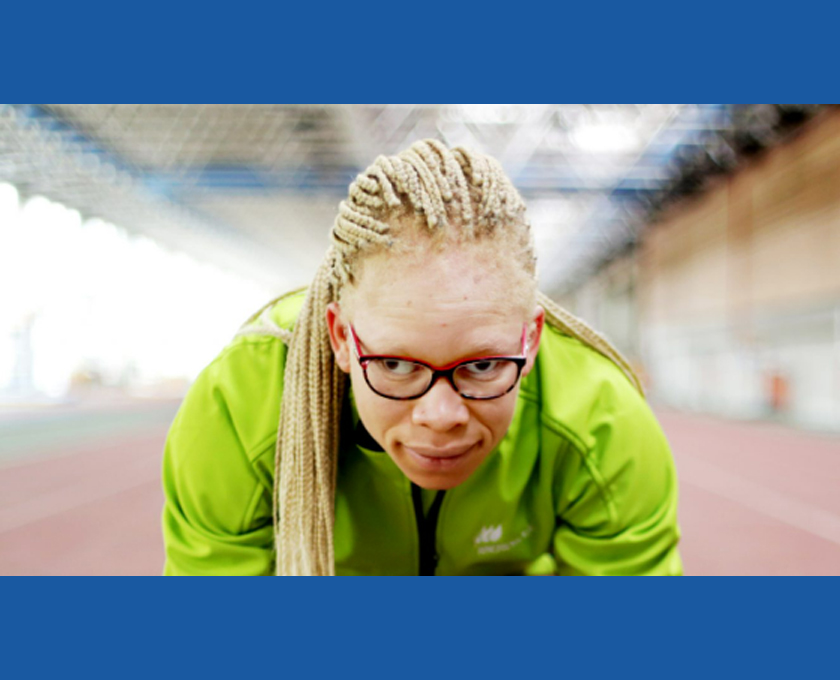February 06, 2024
Paralympic gold medalist shares inspiring story with ABLE

Sprinter Adiaratou Iglesias visited Alcoa’s Madrid office to share her journey as she sets her sights on gold at the Paris 2024 Paralympic Games
Alcoa’s European ABLE chapter hosted a special guest at the Madrid office recently: Adiaratou “Adi” Iglesias, a gold medalist from the 2020 Summer Paralympics who has broken sprinting records in Spain.
Iglesias, who has only 10% of her eyesight due to albinism, has already qualified for the Paris 2024 Paralympic Games. Asked for advice for people with disabilities who are navigating challenges, she said it’s the same advice she’s applied her whole life: Work hard, focus on the things that are important, and be resilient. “Results will come,” she says.
The mission of the ABLE inclusion group is to create a work environment that promotes genuine and sustainable inclusion for people with disabilities, raise awareness in relation and ensure that everyone feels accepted, valued and treated fairly. ABLE stands for Alcoans Moving Beyond Limited Expectations.
“She is such an inspiration for all of us,” said Pablo Díaz Rego, European ABLE Lead. “It was an honor to have her here. We are very proud of her and the way she represents our country.”
See below for a transcript of ABLE’s interview with Iglesias, translated from Spanish and edited for length and clarity.
Tell us about yourself.
I was born in Mali in 1999. When I was 11 years old, I had to leave my country due to superstition surrounding albinism and moved Logroño, Spain, where my brother and sister-in-law were living. As a result of alleged abuse at home, I was placed in foster care where I remained for 2 years until I was adopted by my current family. My mum gave me an opportunity of having a home and supported me with sports.
How is your day-to-day? Is there any difference between an Olympic athlete day and a Paralympic athlete day?
I live at the high-performance center for athletes. I train and study every day, some days in the morning and others in the afternoon. I would say there is no difference between Olympic and Paralympic athletes. We both live in the same place, we eat the same food, we train the same hours; by the way, we compete together many times.
Can you tell us about your disability? How does it affect you in your life and sports?
Because of the albinism, I only have 10% eyesight, which increases to around 20% with glasses. It is almost impossible for me to know when I cross the finish line, but I have found my own tricks. I just listen to my coach when he says: “Adi, it is done.”
I usually train and compete against athletes without disabilities, and I can tell I do very well. At the end of the day, I believe that somehow all of us have disabilities. It happens that I have 10% eyesight, but I am able to overcome it with hard work and dedication.
What do you think companies have to do or change to better integrate people with disabilities into the workforce?
We are just asking to have an opportunity and to be seen as someone who adds value to the company. We don´t like to be a target number that a company must achieve at the end of the year.
What do you think about Alcoa’s ABLE program?
I believe you are doing outstanding work. I really like what Alcoa does in the diversity and inclusion space. I really appreciate the opportunity you gave me to share my experience with you, and I hope it will inspire others and will help to remove any biases.
What kind of advice would you give to a person with a disability who is in front of a personal/professional challenge?
Same thing I have been applying all my life: work hard, focus on things that are important and be resilient. Results will come!
What are your short-term plans? Are you going to participate in the Paris 2024 Paralympic Games?
Yes, the plan is to be in Paris 2024, I was able to qualify, and I already have the ticket. So I will be training hard, studying and spending time with my family and friends.